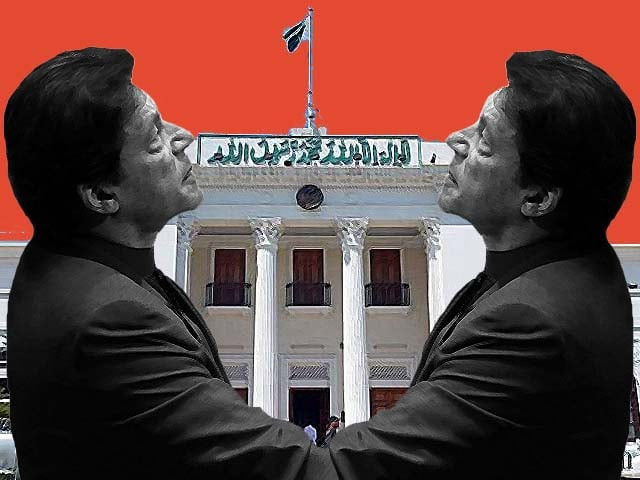One such individual who is concerned at the government's constant promulgation of ordinances is Member National Assembly (MNA) Barrister Mohsin Nawaz Ranjha who has filed a writ petition in the Islamabad High Court against the president's move to promulgate eight ordinances. The barrister, very aptly, wrote in his petition,
“It appears that the ruling party has adopted ordinance-making as the normal and routine method for legislation, while avoiding parliamentary law-making as far as possible.”
Law making is the only prerogative of elected legislatures throughout the world. Pakistan is, unfortunately, amongst the few democratic countries, along with the United States of America, Sri Lanka, Bangladesh, India, Nepal, France and Australia, whose constitution possesses the dubious flaw that gives the power of legislation to the executive.
Ever since the PTI government has taken charge, article 89 of the Constitution of Pakistan which allows the president to promulgate ordinances, has been used time and again even though the article was only meant to be used as a hasty and temporary alternative to parliamentary legislation in order to cope with an emergency situation such as war, famine, epidemic and rebellion which actively put the life, liberty and property of the people of Pakistan at stake. However, the government has made it an article of convenience and so, by extension, it is being used to sidestep the parliamentary system.
There are certain conditions required for ordinance making. Firstly, the parliament, in this case the provincial assembly, should not be in session. Secondly, the existence of circumstances that render it necessary to issue an ordinance should exist. Thirdly, the element of emergency should characterise these circumstances. Lastly, such an ordinance should also have the approval of the cabinet; as added by the Supreme Court of Pakistan in Mustafa Impex case reported as 2016 PTD 2269.
However, judging from the actions of the PTI government, it is apparent that they are not paying heed to the pre-conditions that allow ordinances to be passed. For instance, ordinances such as Administration and Succession Certificate Ordinance, 2019, the Benami Transactions (Prohibition) (Amendment) Ordinance, 2019, the Superior Courts (Court Dress and Mode of Address) Ordinance, 2019, the Legal Aid and Justice Authority Ordinance, 2019, National Accountability (Amendment) Ordinance, 2019 and The Whistle-Blowers Act are clearly not related to a potential emergency.
Moreover, the K-P Civil Law Amendment Ordinance, 2020 was enacted by K-P Governor Shah Farman at a time when a session of the provincial assembly had already been summoned, rescheduled and later postponed, suggesting that the PTI purposely prorogued the session just to promulgate the ordinance, a move that is against the ethos of democracy. Furthermore, the opposition has also claimed that the government purposely avoids calling sessions of the Senate as they fear that proposed ordinances will be disapproved by the House. This begs the question; why is the democratic process of legislation through parliament being sidelined to promulgate ordinances?
It is important to remember that the scope of article 89 was narrowed through the 18th amendment, when the following words were added:
“shall stand repealed at the expiration of the extended period or, if before the expiration, a resolution disapproving it is passed by a House, upon the passing of that resolution.”
This means that an ordinance can be extended only once. The powers of the president and the governors were further curtailed when the chairman of the Senate in 2016 ruled that an ordinance has to be put forth in first sitting of House after promulgation and reasons for same are to be justified. Previously, ordinances which had a lifespan of 120 days were repassed again and again which was essentially subversion of democratic legislative processes. The Supreme Court of Pakistan in Pakistan Medical & Dental Council versus Muhammad Fahad Malik (2018 SCMR 1956) held that:
“15. […]The germane question is this: what is the spirit of the Constitution while authorising the president to enact temporary legislation, i.e. an Ordinance? As mentioned above, under Article 70 of the Constitution, Parliament has the absolute authority to make laws with respect to any matter in the Federal Legislative List. Parliament can pass any Act which is time bound or applicable for a limited period of time. However, it is Article 89 of the Constitution which empowers the president to promulgate an Ordinance […]
[…] it is clear that there are two riders to the power of the president to issue an Ordinance, namely, the Senate or National Assembly must not be in session, and the president must be satisfied that circumstances exist which render it necessary to take immediate action. Meaning thereby, the president’s authority to promulgate an Ordinance is not absolute, rather it depends upon the necessity of immediate action and the non-availability of a session of the Senate or National Assembly.”
Therefore, over the years, substantial attempts have been made to water down the efficacy of article 89, proving that the ultimate goal is to cement parliamentary supremacy and decrease executive overreach.
According to data collected by Dr Ralph Braibanti, a political scientist, the central government has passed 459 ordinances from 1947-1965 and 1,770 were passed during the period 1973-2019. Previously, governments relied on promulgating ordinances when they lacked majority in either houses of the parliament. While this is also the case with the incumbent government in the centre, it seems that the PTI regime is choosing to do so out of pure laziness in K-P seeing how they have an absolute majority in the provincial assembly and can thus pass legislation using the legal parliamentary procedure.
Sadly, the government is also suffering from legal short-sightedness seeing as how they are enacting presidential and gubernatorial ordinances, even though such ordinances are temporary in nature and have a life span of 120 days after which they expire. Furthermore, they can only be reissued once before expiry by the National Assembly through a resolution or turn into permanent law through an act of the parliament.
Some of the ordinances were even declared null and void for being ultra vires of the constitution by high courts, the latest examples being that of Action in Aid of Civil Power Ordinance 2019, which was declared unconstitutional by Peshawar High Court and Fata Interim Regulations which was declared ultra vires or invalid by the Supreme Court of Pakistan.
Simply put, the policy of the promulgating one ordinance after another is against the very basis of democracy. Therefore, a provision which allows for sweeping executive powers should ideally be omitted so that the only route to law-making is through the parliament which will then allow the opposition to be taken into confidence and their opinion to be given due consideration. Such a practice is, after all, one of the pillars of democracy.



COMMENTS
Comments are moderated and generally will be posted if they are on-topic and not abusive.
For more information, please see our Comments FAQ